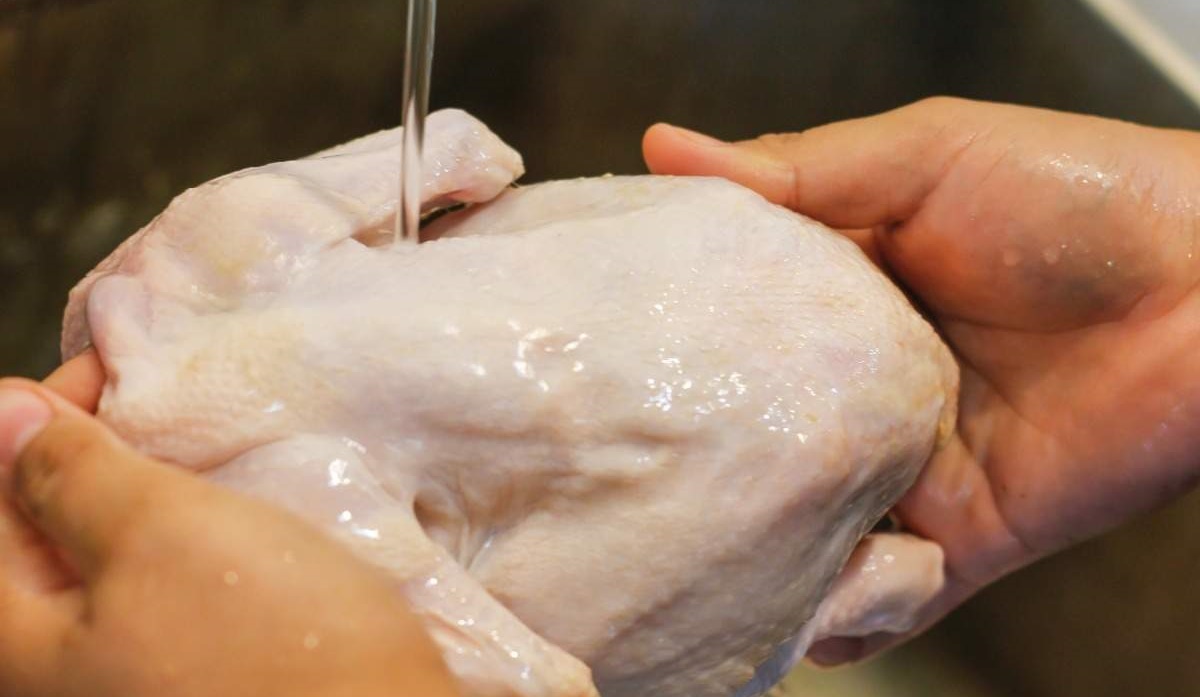Do not wash raw chicken! Here are the damages
Why you shouldn't wash raw poultry meat / Do not wash raw chicken! Here are the damages

Rinsing a ready-to-cook chicken under running water before cooking is routine for many. But for hygiene reasons this is dangerous.
Do not wash raw poultry before cooking. Campylobacter bacteria, which can cause vomiting and diarrhea, are often found on the meat. The splashing water can spread them on the work surfaces and contaminate other foods. Contrary to popular belief, dirt and bacteria are not washed away, but there is a risk of Campylobacter infection.
Splashing water is dangerous
The splash water and the bacteria it contains can spread up to 50 centimetres. This is how kitchen surfaces, cooking utensils and tea towels become contaminated. In most cases, the Campylobacter germs are transmitted via poultry.
Infection does not only occur via meat
But poultry meat is not the only carrier of Campylobacter. People can also become infected with the intestinal germ by consuming raw beef, undercooked pork and raw milk. But the pathogens are also transmitted when they come into contact with animals or when they swallow water from ponds and lakes.
Important hygiene rules for the kitchen
The best way to protect yourself from infection with Campylobacter is to be meticulous about kitchen hygiene. Basically, raw meat should always be prepared separately from all uncooked food before cooking. Under no circumstances should it be cut on the same kitchen board as lettuce or vegetables.
To clean packaged meat, it is sufficient to carefully dab it with kitchen paper. You should then dispose of this immediately and wash your hands thoroughly with warm water.
In order for the meat to become germ-free, it must always be sufficiently cooked – at a temperature of at least 70 degrees for no less than ten minutes. Freezing does not completely destroy the pathogens, it just reduces their numbers.
If raw meat is thawed, the thawed water should be discarded and all objects that have come into contact with it and the meat should be washed thoroughly with hot water.
Most common bacterial notifiable disease
Campylobacter infection is one of the most common foodborne illnesses. Even a single contact with contaminated poultry meat is enough to become infected.
The infection is usually mild. However, according to the World Health Organization (WHO), extreme caution is required for small children, the elderly, pregnant women and patients with a weakened immune system. For them, an infection can cause serious damage to their health and even be fatal.
According to the Robert Koch Institute, this is becoming one of the most common notifiable bacterial infections in Germany. The number of reported illnesses is between 60,000 and 70,000 each year – experts suspect, however, that the actual number is much higher, since many consumers are unaware of Campylobacter. Adults between the ages of 20 and 29 are particularly affected.
How to recognize an illness
It is typical of the course of a Campylobacter infection that the disease does not make itself felt immediately. Three to four days can pass before symptoms such as diarrhea, stomach cramps or fever appear. It is therefore often not clear to those affected what caused them to become ill. It is usually sufficient to replace the loss of fluid and minerals. Antibiotics are usually not necessary.
However, sick people excrete the contagious bacteria for two to four weeks. They should therefore stay at home at least during the illness and pay particular attention to personal hygiene. The infections must be reported to the authorities by the laboratory.
medication as a risk factor
Scientists found in a study that taking proton pump inhibitors (PPIs) increases the risk of infection. The risk increases especially if gastric acid inhibitors such as pantoprazole or omeprazole were taken up to four weeks before the illness.
The Robert Koch Institute advises: “Patients who take gastric acid inhibitors should be informed about the connection with bacterial gastrointestinal infections so that they can adjust their diet and, if necessary, avoid certain foods such as meat that has not been fully cooked through.”
The study compared the data of 1,812 infected and 3,983 controls between 2011 and 2014. The main focus was on the source of infection. Fresh chicken meat and contact with poultry stood out in particular. The researchers were also able to detect Campylobacter in up to 54 percent of fresh chicken meat samples from the retail trade.


